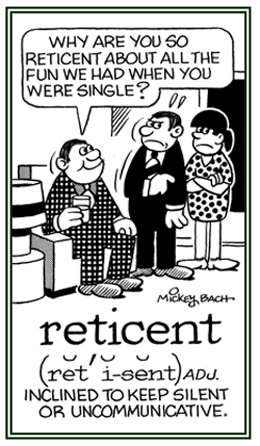-ent
(Latin: adjective suffix signifying action or being; performing a particular acion)
Something or someone who is the object of a comment or a suggestion: Professor Joan was the referent in the speech by the university president who cited her outstanding qualities as a teacher and as head of research in her department.
refluent
Flowing back; ebbing, as the tide.
refulgent (ri FOOL juhnt, ri FUL juhnt) (adjective), more refulgent, most refulgent
1. Conveying radiant or beaming lights that are brilliant and shining: Crystal chandeliers and gilded walls made the opera house a refulgent setting for the concert.
2. Characteristic of something which is gleaming, resplendent and radiant: Bobby and Rosetta were admiring the refulgent moon in the beautiful night sky.
3. Etymology: from Latin: refulgere, "to shine brightly".

© ALL rights are reserved.
Go to this Word A Day Revisited Index
2. Characteristic of something which is gleaming, resplendent and radiant: Bobby and Rosetta were admiring the refulgent moon in the beautiful night sky.
3. Etymology: from Latin: refulgere, "to shine brightly".

Go to this Word A Day Revisited Index
so you can see more of Mickey Bach's cartoons.
relent
1. To become more sympathetic or amenable and to do something previously ruled out or to allow something previously forbidden to take place.
2. To slacken or to become less intense; to soften in temper; to become more gentle or compassionate.
3. Etymology: "to melt, to soften, to dissolve", from re-, "again" + Latin lentus, "slow, viscous, supple". The sense of "become less harsh or cruel" was first recorded in 1526.
2. To slacken or to become less intense; to soften in temper; to become more gentle or compassionate.
3. Etymology: "to melt, to soften, to dissolve", from re-, "again" + Latin lentus, "slow, viscous, supple". The sense of "become less harsh or cruel" was first recorded in 1526.
1. A person who lives or dwells in a place.
2. A physician who joins the medical staff of a hospital as a salaried employee for a specified period to gain advanced training; usually, in a particular field, being in full-time attendance at the hospital and often living on the premises.
3. A diplomatic representative, inferior in rank to an ambassador, living in a foreign embassy.
4. Something which is encoded and permanently available to a computer user, as a font in a printer's ROM or software on a CD-ROM.
5. A computer program that is currently active or being available in a computer memory.
2. A physician who joins the medical staff of a hospital as a salaried employee for a specified period to gain advanced training; usually, in a particular field, being in full-time attendance at the hospital and often living on the premises.
3. A diplomatic representative, inferior in rank to an ambassador, living in a foreign embassy.
4. Something which is encoded and permanently available to a computer user, as a font in a printer's ROM or software on a CD-ROM.
5. A computer program that is currently active or being available in a computer memory.
resilient (adjective), more resilient, most resilient
1. Pertaining to the ability to recover quickly from setbacks or referring to the capability of springing back or rebounding from a disadvantageous situation: The resilient athletes were able to win the game despite having such a low score during the first half.
3. Marked by the ability to recover readily, as from misfortune or disastrous situations: "The killers who struck this week are brutal and violent," President Bush said, "but terror will not have the final word because the people of India are resilient. They can withstand this trial."
4. Descriptive of something that is capable of regaining strength, being healthy again, or having successful results after something bad has occurred: Many people are hoping that the economy will be resilient and recover from the monetary losses that took place.
5. With computer technology, the ability to recover from a failure: The resilient site was "up" and available to users again after having been "down" for over two hours because of technical problems.
6. Etymology: from about 1626, from Latin resiliens, resilire, "to rebound, to recoil"; from re-, "back" + salire, "to jump, to leap".

© ALL rights are reserved.
Go to this Word A Day Revisited Index
Resilient children can usually recover from minor accidents more quickly than other less resilient ones.
2. Regarding something that can fly back quickly into shape after being twisted, expanded, or squashed: Rubber is one of the most resilient products that we know about.3. Marked by the ability to recover readily, as from misfortune or disastrous situations: "The killers who struck this week are brutal and violent," President Bush said, "but terror will not have the final word because the people of India are resilient. They can withstand this trial."
4. Descriptive of something that is capable of regaining strength, being healthy again, or having successful results after something bad has occurred: Many people are hoping that the economy will be resilient and recover from the monetary losses that took place.
5. With computer technology, the ability to recover from a failure: The resilient site was "up" and available to users again after having been "down" for over two hours because of technical problems.
6. Etymology: from about 1626, from Latin resiliens, resilire, "to rebound, to recoil"; from re-, "back" + salire, "to jump, to leap".

Go to this Word A Day Revisited Index
so you can see more of Mickey Bach's cartoons.
resolvent
reticent (adjective), more reticent, most reticent
1. Descriptive of someone who is restrained and reserved; given to silence or to say very little: Adam is a reticent refugee who doesn't want to discuss his past with other people in his new country.
2. Etymology: from Latin reticentia, "silence"; from reticere, "to keep quiet"; from re-, "again, once more" + tacere, "to be silent."

© ALL rights are reserved.

© ALL rights are reserved.

© ALL rights are reserved.
Go to this Word A Day Revisited Index
2. Etymology: from Latin reticentia, "silence"; from reticere, "to keep quiet"; from re-, "again, once more" + tacere, "to be silent."



Go to this Word A Day Revisited Index
so you can see more of Mickey Bach's cartoons.
1. Usually, a small furry mammal whose teeth never stop growing: "The rodent species includes mice, rats, squirrels, beaver, and many other rodents."
2. Etymology: from Latin rodentem, rodens, from rodere, "to gnaw, to eat away"; from red-, "to scrape, to scratch, to gnaw"; from Latin >radere, "to scrape".
2. Etymology: from Latin rodentem, rodens, from rodere, "to gnaw, to eat away"; from red-, "to scrape, to scratch, to gnaw"; from Latin >radere, "to scrape".
sapient
1. Acutely insightful and wise.
2. Having or showing great wisdom or sound judgment.
2. Having or showing great wisdom or sound judgment.
sentient (adjective), more sentient, most sentient
1. Characteristic of a person or animal that is able to experience what is going on; conscious: All sentient animals are able to see, hear, smell, taste, and feel unless they have been deprived of a sensory element as a result of injury or some other damage to their senses.
2. Regarding an animal or a human being that responds emotionally rather than intellectually: Carol is convinced that her cat has sentient reactions when she is packing her suitcase to go on vacation because her feline always reacts by being sad and angry.
2. Regarding an animal or a human being that responds emotionally rather than intellectually: Carol is convinced that her cat has sentient reactions when she is packing her suitcase to go on vacation because her feline always reacts by being sad and angry.
sequent (adjective)
subjacent (adjective), more subjacent, most subjacent
1. Conveying to something that is located nearby but underneath or below it.
2. Etymology: from Latin subjacens, subjacentis which came from subjacere, "to lie underneath"; from sub-, "under" + jacere, "to lie, to rest".
2. Etymology: from Latin subjacens, subjacentis which came from subjacere, "to lie underneath"; from sub-, "under" + jacere, "to lie, to rest".
subsequent (adjective)
tangent (adjective)
Making contact at a single point or along a line; touching but not intersecting.


